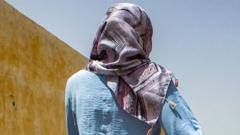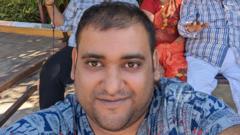The ongoing civil war has led to a surge in violence, including sexual violence against women, with rights organizations warning of the devastating psychological toll on survivors.
**Escalating Tragedy: Women in Sudan Suicide After Rape Amid Ongoing Conflict**

**Escalating Tragedy: Women in Sudan Suicide After Rape Amid Ongoing Conflict**
The humanitarian crisis deepens in Sudan as reports indicate several women have taken their lives following sexual assaults by paramilitary forces.
In the wake of the brutal civil war that has engulfed Sudan since April 2023, reports have surfaced from the central Gezira state indicating that several women have tragically chosen to end their lives after suffering sexual violence at the hands of paramilitary fighters. Activists and human rights groups are sounding the alarm about the urgent need for intervention as the situation continues to deteriorate.
The paramilitary group in question, the Rapid Support Forces (RSF), has been accused of terrible atrocities, including rape and mass killings, in a United Nations report spurring widespread condemnation. As the conflict progresses, concerns are mounting that the likelihood of such incidents will only rise. One rights organization reported that they are in contact with women who are contemplating suicide out of fear for their safety, citing a particularly distressing climate where sexual violence has become commonplace.
The RSF, for its part, has dismissed the UN's claims, asserting that the allegations lack concrete evidence. Yet, many survivors and witnesses provide harrowing accounts of the impact of the RSF’s aggression in streets once peaceful. "The RSF began a revenge campaign... they looted, killed, and raped," reported Hala al-Karib, the head of the Strategic Initiative for Women in the Horn of Africa (Siha).
Tragically, amidst the conflict's devastation, three confirmed cases of suicide among women in Gezira state emerged during the past week as their families grappled with the ravaging consequences of violence and loss. Victims have been subjected to heinous acts in front of their loved ones, leading to immense trauma and despair. Reports have also circulated of an alleged massacre in Al Seriha, contributing to the prevailing sense of hopelessness.
Although channels of communication in many areas remain unreliable, activists are desperately working to provide psychological support to women in distress and facilitate their relocation to safer environments. Specific cases illustrate the dire need for medical assistance; one recent incident involved a 13-year-old girl who had suffered grievously at the hands of RSF fighters and was in desperate need of care.
A recent UN report revealed that at least 400 incidents of conflict-related sexual violence have been documented, with the assumption that the real number may far surpass this figure. Victims range in age from eight to 75 years, yet the ongoing violence has rendered many hospitals and medical facilities inoperable.
Economic hardship paired with lack of security has positioned Sudan on the brink of one of the largest humanitarian crises the world has ever faced, with millions facing starvation should the violence continue without intervention.
As the international community watches with concern, the ongoing crisis in Sudan serves as a grim reminder of the consequences of warfare on innocent civilians, particularly women and children, who bear the brunt of such suffering.
The paramilitary group in question, the Rapid Support Forces (RSF), has been accused of terrible atrocities, including rape and mass killings, in a United Nations report spurring widespread condemnation. As the conflict progresses, concerns are mounting that the likelihood of such incidents will only rise. One rights organization reported that they are in contact with women who are contemplating suicide out of fear for their safety, citing a particularly distressing climate where sexual violence has become commonplace.
The RSF, for its part, has dismissed the UN's claims, asserting that the allegations lack concrete evidence. Yet, many survivors and witnesses provide harrowing accounts of the impact of the RSF’s aggression in streets once peaceful. "The RSF began a revenge campaign... they looted, killed, and raped," reported Hala al-Karib, the head of the Strategic Initiative for Women in the Horn of Africa (Siha).
Tragically, amidst the conflict's devastation, three confirmed cases of suicide among women in Gezira state emerged during the past week as their families grappled with the ravaging consequences of violence and loss. Victims have been subjected to heinous acts in front of their loved ones, leading to immense trauma and despair. Reports have also circulated of an alleged massacre in Al Seriha, contributing to the prevailing sense of hopelessness.
Although channels of communication in many areas remain unreliable, activists are desperately working to provide psychological support to women in distress and facilitate their relocation to safer environments. Specific cases illustrate the dire need for medical assistance; one recent incident involved a 13-year-old girl who had suffered grievously at the hands of RSF fighters and was in desperate need of care.
A recent UN report revealed that at least 400 incidents of conflict-related sexual violence have been documented, with the assumption that the real number may far surpass this figure. Victims range in age from eight to 75 years, yet the ongoing violence has rendered many hospitals and medical facilities inoperable.
Economic hardship paired with lack of security has positioned Sudan on the brink of one of the largest humanitarian crises the world has ever faced, with millions facing starvation should the violence continue without intervention.
As the international community watches with concern, the ongoing crisis in Sudan serves as a grim reminder of the consequences of warfare on innocent civilians, particularly women and children, who bear the brunt of such suffering.






















